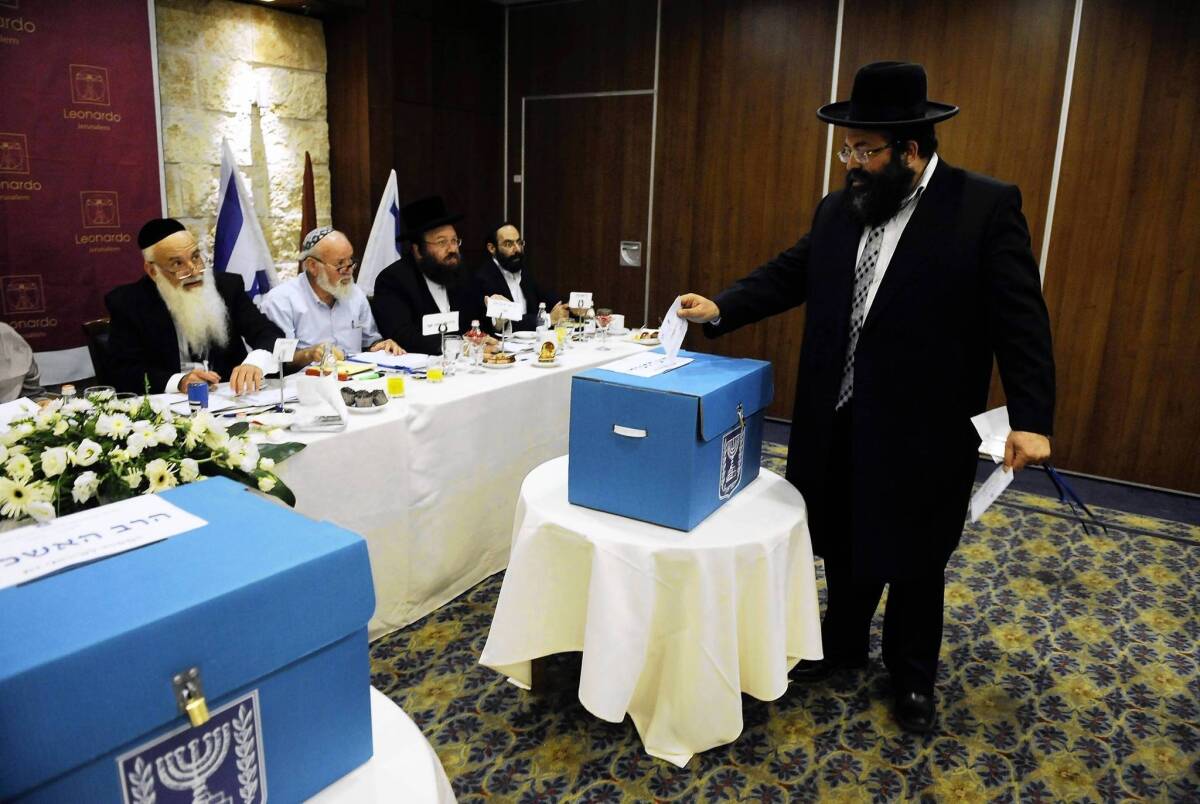Ultra-Orthodox again elected as Israel’s two chief rabbis

- Share via
JERUSALEM — There was no white smoke and little pomp, but a collection of religious and political leaders emerged Wednesday from a much-anticipated private meeting in a Jerusalem hotel to announce the election of Israel’s next two chief rabbis, who will take their place among the nation’s most influential religious figures.
It was a bruising, sometimes ugly campaign in which many of the candidates were tainted by allegations of corruption, nepotism or racism, underscoring why the government-funded rabbinate has fallen so low in public opinion in recent years.
When the dust settled, a collection of 150 legislators, religious court judges, mayors and municipal rabbis once again selected two candidates representing the ultra-Orthodox community, which has dominated the institution for 20 years.
David Lau, 47, the longtime rabbi from Modiin, will serve as chief rabbi for Israel’s Ashkenazi community, and Yizthak Yosef, 61, son of prominent Israeli rabbi Ovadia Yosef, will represent Sephardic Jews. Ashkenazi Jews originated in Europe and Sephardic Jews come from the Middle East and North Africa.
The 10-year term puts each man at the helm of a vast system of state-run religious institutions, responsible for thousands of appointments and jobs.
It also gives them considerable legal authority over Jewish citizens in matters of marriage, divorce, women’s rights, conversion, certification of kosher food and restaurants and deciding who is considered a Jew in Israel.
The ultra-Orthodox faced a stiff challenge this year from a faction of modern Orthodox Zionists, who launched a vigorous campaign to install its own leaders in the posts.
Many viewed the election as proxy battle between Shas party head Aryeh Deri, representing the ultra-Orthodox, and Jewish Home party leader Naftali Bennett, on behalf of those who want to modernize the rabbinate. Each man lobbied hard for his preferred candidates.
“For two decades, the main battle was between Ashkenazi and Sephardic ultra-Orthodox,” said Yair Sheleg, research fellow at the Israel Democracy Institute. “Now that Zionist orthodoxy has made a political comeback [with Jewish Home’s success in the last election], the historic dispute between the two main streams, Zionist Orthodoxy and ultra-Orthodoxy, has been revived.”
It was a rematch of sorts: In national elections this year, Jewish Home help shut out Shas from the new coalition government under Prime Minister Benjamin Netanyahu, leaving the ultra-Orthodox out of the Cabinet for the first time in nearly a decade.
This time, however, Shas emerged the victor. The election of the two ultra-Orthodox candidates suggests there will be few changes in the rabbinate’s practices or interpretations of Judaism.
Unsuccessful candidate Rabbi David Stav, who was strongly backed by the modern Orthodox community for the Ashkenazi position, rattled the ultra-Orthodox by promising to reform the rabbinate into a more “user-friendly” institution.
The campaign was marked by one scandal after another. Outgoing Chief Rabbi Yona Metzger was put under house arrest on suspicion of bribery. Former candidate Rabbi Avraham Yosef dropped out of the race after being questioned by the police on suspicion of fraud.
The attorney general sought to disqualify the candidacy of Rabbi Shmuel Eliyahu, whose past statements urging Jews to avoid renting to Arabs were deemed racist and inappropriate.
Rabbi Ovadia Yosef, the spiritual leader of Shas, publicly questioned the Jewishness of some of the modern Orthodox candidates. His critics, in turn, accused him of using his position to favor the candidacy of his son.
But that wasn’t unusual. Most of the candidates were sons of former chief rabbis or Knesset members.
Noting the heavy undercurrent of partisan politics and religious rivalry in the race, several commentators joked that it was a good thing the process occurs only once a decade.
Some are calling for an overhaul of the state rabbinate and question whether it still serves a valuable purpose. Most Orthodox Israelis turn to their community rabbis for guidance, rather than government institutions. And many seculars resent the legal authority vested in the rabbinate in matters of marriage and divorce.
“It is time to throw out the whole rabbinate,” Anat Hoffman, director of the liberal advocacy group Israel Religious Action Center, said in an email to supporters. “This symbolic position represents more than its own corruption. It is a constant reminder that Jews in Israel lack the religious choices that Jews abroad enjoy.”
Others argue it still has a role in preserving the Jewish character of Israel.
“The chief rabbinate is an atrophied body, corrupt to a large degree too,” said Yedidia Stern, professor at Bar-Ilan University Law School. “But personally speaking, as an Israeli citizen and a religious Jew, I hope it is possible to rehabilitate the rabbinate. ... It can be part of our promise that Israel will be both Jewish and democratic without compromising either. Headed by the right person, it is an institution worth fighting for.”
News assistant Batsheva Sobelman in The Times’ Jerusalem Bureau contributed to this report.
More to Read
Sign up for Essential California
The most important California stories and recommendations in your inbox every morning.
You may occasionally receive promotional content from the Los Angeles Times.









